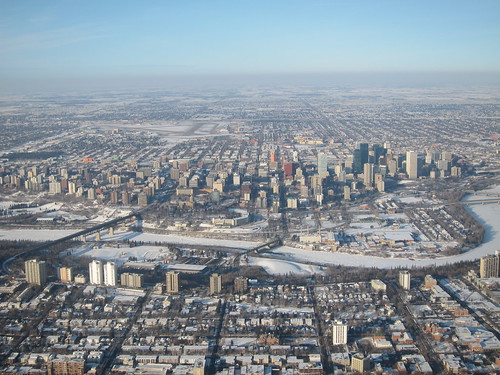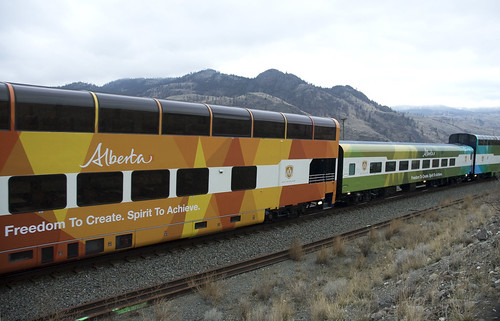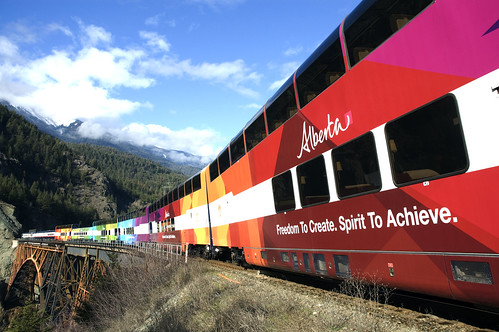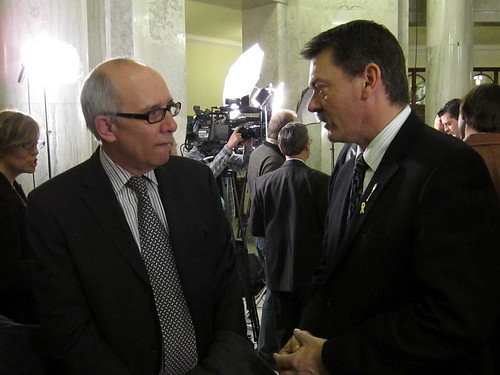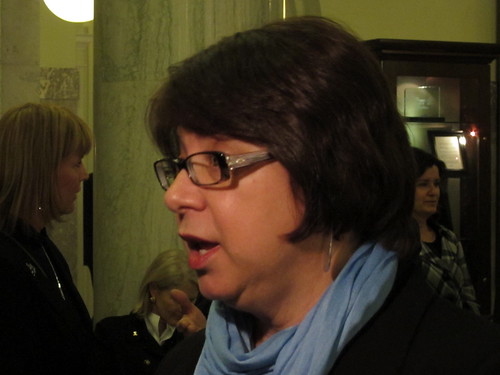I had a very interesting meeting over breakfast at the SugarBowl on Saturday morning with some of the members involved in the new Alberta Party. Most Albertans probably did not even know that an Alberta Party even existed. Most Albertans would probably be surprised at what a busy couple of months it has been for the tiny political party that has so far occupied a historical footnote worth of activity.
At a meeting in Sylvan Lake in early January 2010, members of
Renew Alberta and the board members of the Alberta Party met to flesh out ideas on how they could work together. While the little-known Alberta Party has found itself in the "right-wing" category for most of its existence, I am told that by January 2010, most of the more socially conservative members had left that party to join the
Wildrose Alliance. This left a tight-knit group of people from central Alberta, old Reformers with a centrist bent, on that party's board. After meeting to discuss the 'merger' with Renew Alberta, the members of the Alberta Party board voted first to unanimously to suspend their party policies (many of which were developed in the 1980s) and second to welcome members of Renew Alberta to join their board, starting a fresh.
Former Green Party Deputy Leader
Edwin Erickson was collecting signatures to create a new '
Progress Party,' when he was approached to join the Alberta Party and run its leadership late last year. He was soon after acclaimed as Leader. Erickson is well-known in central Alberta for his opposition to the new transmission line laws (
Bill 46,
Bill 50, and
Bill 19) and he placed a distant, but strong, second when running in the
Drayton Valley-Calmar in the 2008 election.
Erickson was joined at our Saturday morning breakfast meeting by two new Alberta Party board members. Chris Labossiere is
a successful businessman and is the former VP Communications for the
Edmonton-Whitemud Progressive Conservative Association. He
left the PC Party in 2009 after the
Bill 44 controversy.
David King is one of the few Albertans still involved in politics who was around the last time a change in government happened. As the MLA for
Edmonton-Highlands from 1971 to 1986 and Minister of Education from 1979 to 1986, King was closely involved with building the PC Party under its first Premier
Peter Lougheed. King was also one of the founding forces behind the similarly named, yet differently focused,
Reboot Alberta.
The co-chair of Renew Alberta, who will be heavily involved as a spokesperson for the new Alberta Party, is
Chima Nkemdirim, a lawyer from Calgary who until the last election was involved with the
Liberal Party as campaign manager for
Calgary-Buffalo MLA
Kent Hehr. Taking a look at the list of the new Alberta Party board members revealed a healthy mix of very urban and very rural, and young and old with diverse political and community backgrounds. I know many of these people and have a lot of respect for what they are doing (I am told that the full list of board members for the new Alberta Party will be released when the new website is fully launched in March).

With the old party policies suspended, the new Alberta Party plans to focus their energies not on selling party memberships or building constituency organizations (at least now), but on 'The Big Listen' - a conversation with Albertans. Critical to their success is the need for 'The Big Listen' to be more than an exercise in faux-populism. We have seen a brand of faux-populism from the traditional political parties where they travel the province to "listen to Albertans" or hear "what Albertans want," only to return with a pre-determined partisan or ideological policy stance. In many ways, "listening to Albertans" has turned into an exercise in market research and brand development, rather than sincere governance. If the new Alberta Party is to be successful, "The Big Listen" needs to be a real exercise in collaborative policy development and ideas generation.
I was told that the new Alberta Party is planning to go beyond the traditional dreary town hall meeting to help supporters to host smaller and more intimate meetings in living rooms and seniors centres across Alberta. One of the ideas proposed at the breakfast meeting was the use of technology to create a collaborative atmosphere online where citizens can contribute beyond the on-going 'Big Listen' meetings.
As explained to me, the immediate goal for the people involved with the new Alberta Party is not to form government or to create another top-down leader dominated party, but to help change the culture of governance in Alberta. To "turn fear into hope and isolation into collaboration" by re-engaging Albertans in the way they are governed. If you think this sounds a bit like the language of
ChangeCamp, you are correct. Some of the people involved in the new Alberta Party have also been involved or attended
ChangeCamp in Edmonton,
CivicCamp in Calgary, and
Reboot Alberta.
Over breakfast, the example of
Nokia was brought up. Responding to changing markets, the Finnish mobile phone company adopted an overlying strategy geared towards collaboration with their customers, rather than purely focusing on competition with other mobile phone companies. When this idea is applied politically, it is a large step away from the traditional confrontational mentality of annihilating your opponents at any cost. It should not be, but it is a novel idea, and not one that any of the traditional political are offering in any sincere way.
Throughout our discussion, the underlying theme I sensed from Erickson, Labossiere, and King was a desire for more accountable, transparent, and honest governance and a greater role for citizen engagement in how Albertans are governed. Essentially, an engaged, reformed, and accountable government reflective of the citizens of this province.
I have already heard harsh criticisms from friends in the PC, Liberal, and
New Democratic parties that a new Alberta Party will only serve to split the centrist vote in the next election even further, helping the Wildrose Alliance to win more seats. There is a chance of this, but I have a difficult time seriously discussing vote splitting when 60% of Albertans did not vote in the last election. The traditional political parties have proven that they are uninterested or incapable of renewing themselves beyond what is politically most convenient in the short-term - and that is not good enough. As I wrote in response to comments in
my previous post, maybe the new Alberta Party will flop, but maybe they will make politics more interesting (and more positive) for the average Albertan. I'm open minded and willing to give them a chance.
(You can find the Alberta Party online on Facebook and on Twitter)
